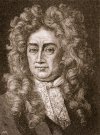Leading Figures in International Law
Samuel von Pufendorf (1632-1694)
| By: Taylor G. Stout, Reporter, International Judicial Monitor |

Biography
Samuel von Pufendorf was a seventeenth century German jurist, historian, philosopher, and statesman renowned for his influential writings on international and natural law. He was born the son of a Lutheran minister in Saxony in 1632. Initially intending to follow in his father’s footsteps, von Pufendorf studied theology at the University of Leipzig. Eventually, however, he gave up the study of theology and pursued legal studies at the University of Jena. Following his legal studies, von Pufendorf became a tutor to the children of the Swedish ambassador to Denmark. When relations between Sweden and Denmark broke down, Denmark arrested and imprisoned much of the Swedish envoy, including von Pufendorf. He spent eight months in prison.
While in prison, von Pufendorf occupied himself by reflecting on the works of Hugo Grotius and Thomas Hobbes. Upon his release, he traveled to the University of Leiden, where he published The Two Books of the Elements of Universal Jurisprudence in 1661. The success of this work led to von Pufendorf’s appointment to the chair of the law of nature and nations at the University of Heidelberg. The professorship was the first of its kind, created for him.
In 1667, von Pufendorf published On the State of the German Empire, criticizing the Holy Roman Empire and the Austrian House of Hapsburg. Ultimately, as a result of his criticism, he was forced to leave the University of Heidelberg. He accepted a chair at the University of Lund in Sweden in 1670. While there, he published The Eight Books on the Law of Nature and Nations in 1672. The work is considered his masterpiece. Von Pufendorf published a summary of the work, entitled On the Duty of Man and Citizen, in 1673.
Von Pufendorf was named the Royal Historiographer of Sweden in 1677, and he moved to Stockholm. Following this appointment, he abandoned legal studies. During his tenure as Royal Historiographer, he wrote a general history of Europe, which is considered one of the first modern textbooks on European history. Von Pufendorf’s historical work was noted for its emphasis on accuracy and its reliance on archival materials for support. He held the post of Royal Historiographer until his death in 1694.
Work and Influence
Von Pufendorf was heavily influenced by the works of Thomas Hobbes and Hugo Grotius. In his masterpiece, The Eight Books on the Law of Nature and Nations, von Pufendorf argued that man’s natural state is a state of peace, contrasting this view with Hobbes’s theory that man’s natural state is a state of war. Von Pufendorf also posited that the scope of natural law is confined to the period of life on this earth and that it derived from human reason. Finally, he expounded his conception of just war theory, and he asserted that international law extends to all nations, emphasizing that all nations are part of humanity.
In his later historical works, von Pufendorf explored the relationship between church and state. He proposed a collegial theory of church government that subsequently proved influential in Germany and Prussia. Because of his views on toleration and the separate spheres of church and state governments, many scholars consider von Pufendorf a forerunner of Enlightenment thought in Germany.
Von Pufendorf’s contributions to the fields of international law, natural law, and church-state relations rendered him an enormous influence on Enlightenment thinkers, including John Locke, Jean-Jacques Rousseau, and Montesquieu. His influence also extended to the founding generation of Americans, including Alexander Hamilton, James Madison, and Thomas Jefferson. Because of the long-lasting and profound impact of his ideas, von Pufendorf is rightly remembered as a leading figure in international law.
Sources:
http://www.acton.org/pub/religion-liberty/volume-12-number-1/samuel-von-pufendorf

 International
Judicial Monitor
International
Judicial Monitor